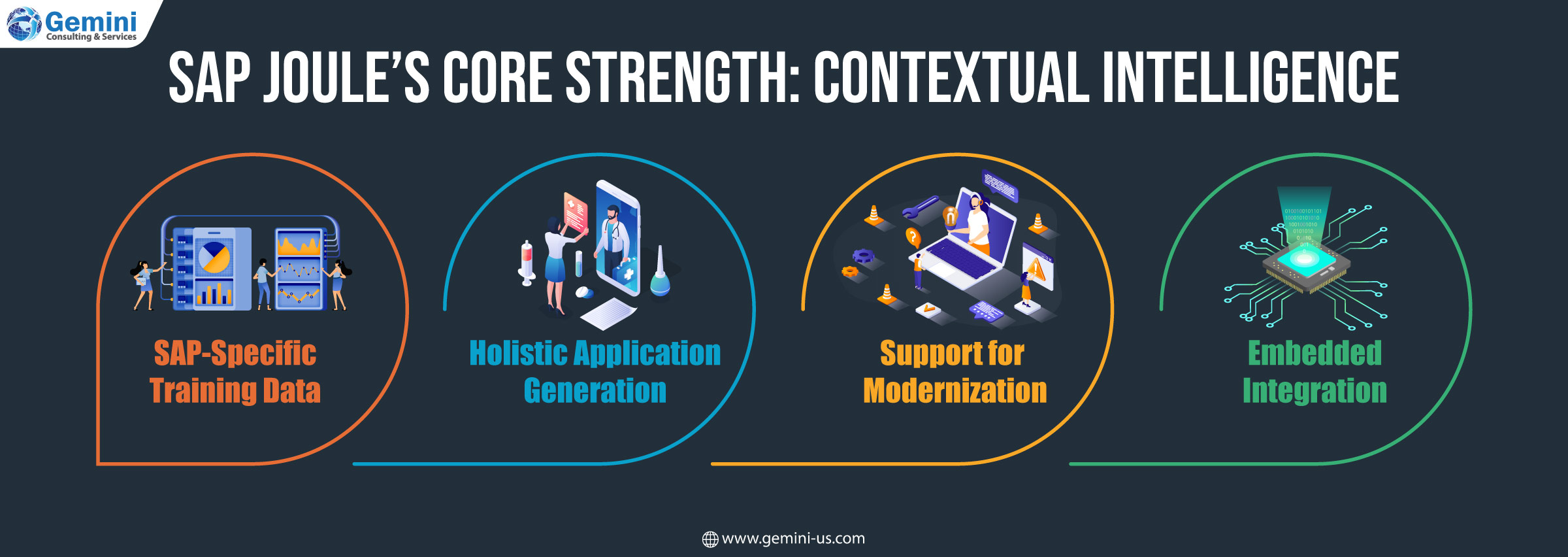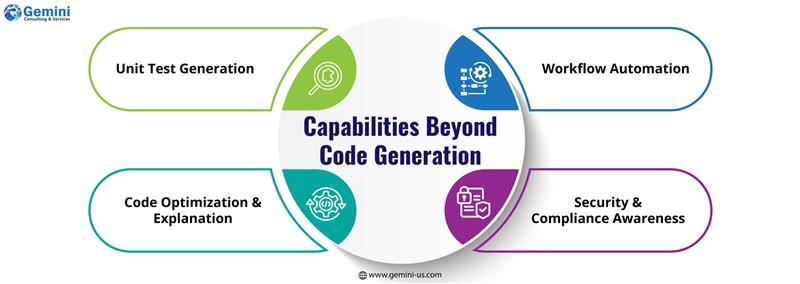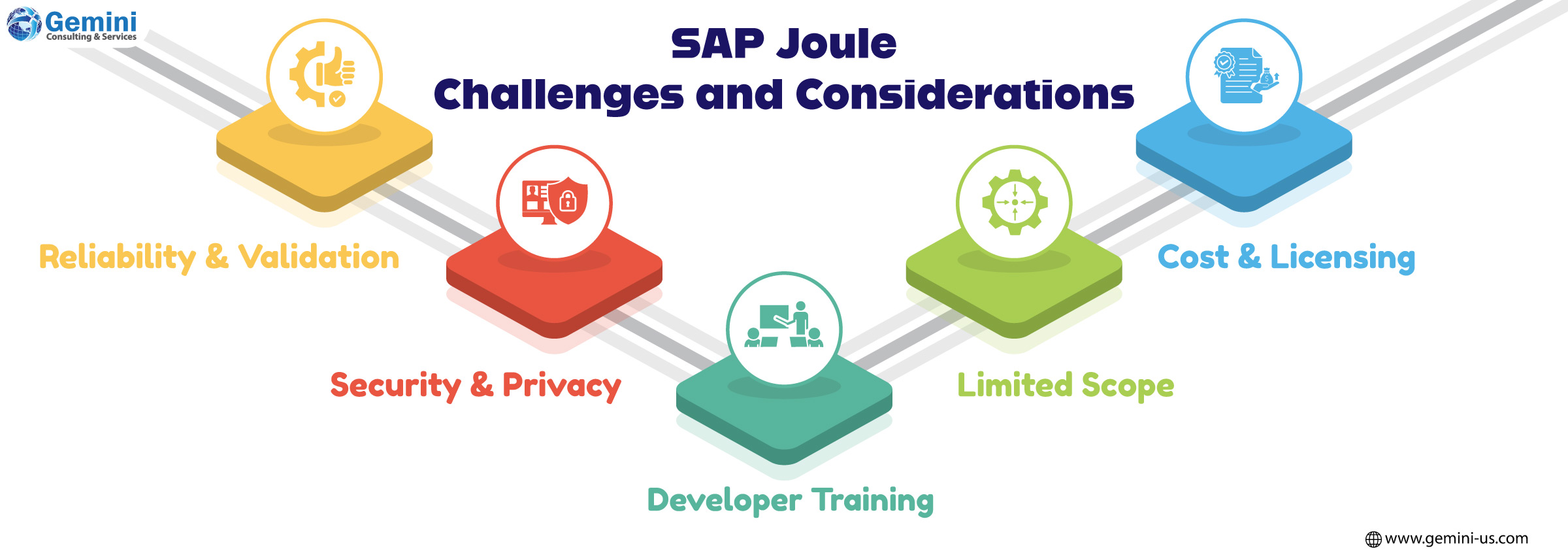The intersection of Artificial Intelligence (AI) and enterprise software development has reached a new milestone with SAP Joule, a generative AI assistant designed to enhance productivity, automation, and innovation within the SAP ecosystem. Initially introduced as an AI companion for business users, Joule has now evolved to support developers, offering advanced code generation and automation capabilities for SAP Build and ABAP environments.
This expansion signals SAP’s strategic intent to redefine how developers build, test, and modernize enterprise applications.
Understanding SAP Joule for Developers
SAP Joule for Developers is an AI-driven toolkit embedded across SAP’s key development environments, SAP Build Apps, SAP Build Code, and ABAP Development Tools (ADT). Unlike general-purpose coding assistants, Joule is trained specifically on SAP’s proprietary data, including ABAP syntax, Cloud Application Programming (CAP) model, Fiori design principles, and clean core development standards.
According to SAP, Joule can accelerate development by up to 30%, automate repetitive tasks, and improve developer proficiency through contextual AI assistance. Its value lies not just in generating lines of code, but in understanding the context, structure, and compliance requirements of enterprise-grade SAP solutions.

Joule’s biggest advantage is its deep contextual awareness of the SAP landscape, something general-purpose AI models like GitHub Copilot or ChatGPT lack. This specialization allows Joule to interpret SAP-specific terminology, frameworks, and workflows accurately.
- SAP-Specific Training Data: Joule’s training encompasses millions of lines of ABAP and JavaScript code from SAP’s own systems and documentation. This foundation enables it to generate code that is not just syntactically correct but also adheres to SAP’s best practices and architectural guidelines.
- Holistic Application Generation: Developers can describe their intent in plain language, such as “Create an ABAP RAP service for purchase order approvals,” and Joule can generate complete application components. This includes Core Data Services (CDS) views, business logic classes, service definitions, and even sample datasets, significantly speeding up development.
- Support for Modernization: For organizations migrating from legacy SAP ECC systems to S/4HANA Cloud, Joule can assist by analyzing legacy code, explaining logic, suggesting modern ABAP equivalents, and ensuring compliance with ABAP Cloud standards.
- Embedded Integration: Joule is not a standalone product. It is seamlessly integrated into SAP’s development environments, minimizing context switching. Whether working in ABAP Development Tools (Eclipse) or SAP Build Code (for Java/JavaScript), developers interact with Joule through familiar interfaces enhanced by AI.

While Joule’s primary appeal is its ability to generate code, its utility extends into other critical areas of the software development lifecycle.
- Unit Test Generation: Joule can automatically create and suggest unit tests for newly generated code, supporting test-driven development.
- Code Optimization & Explanation: It helps identify redundant or inefficient logic and provides human-readable explanations, assisting newer developers in understanding complex ABAP constructs.
- Workflow Automation: Joule can derive business rules or automation flows from natural language instructions, enhancing integration between process automation and custom application logic.
- Security & Compliance Awareness: As an enterprise-grade tool, Joule’s outputs are governed by SAP’s internal validation rules, reducing the risk of AI “hallucinations” and non-compliant code.
Impact Across the SAP Ecosystem
The introduction of Joule for developers affects several key stakeholders.
- Developers gain a co-pilot that reduces repetitive coding and debugging tasks, allowing them to focus on higher-value design and optimization work.
- Business users benefit from faster delivery of applications and automations, bridging the gap between business needs and technical implementation.
- SAP customers see reduced development timelines, improved software quality, and potentially lower total cost of ownership for custom solutions.
- SAP itself strengthens its market position, differentiating Joule from other enterprise AI assistants like Salesforce Einstein or Microsoft Copilot through deep, domain-specific integration.
Comparing Joule with General-Purpose AI Tools
When evaluated against broader AI code assistants, SAP Joule demonstrates clear strengths and some limitations.
| Aspect | SAP Joule | General AI Assistants |
|---|---|---|
| Specialization | Deep SAP expertise (ABAP, CAP, Fiori) | General coding knowledge across languages |
| Integration | Embedded in SAP Build & ADT | Integrated with generic IDEs like VS Code |
| Context Awareness | High (understands SAP business models & data structures) | Limited enterprise context |
| Flexibility | Best within SAP ecosystem | Strong for cross-platform or open-source development |
| Output Reliability | Enterprise-validated, lower hallucination risk | May require manual correction |
While Joule’s specialized nature gives it unmatched strength within SAP environments, it also introduces platform lock-in. Developers working across diverse stacks or non-SAP infrastructures might find general-purpose tools more flexible.
If your enterprise is looking for an AI-integrated tool to help developers generate code and reduce time to market, Gemini Consulting & Services can assist you. With over 10 years of experience in developing and supporting enterprise applications, we are well-placed to help clients improve operational efficiency and productivity. Contact us to know how SAP Joule can help your enterprise.

Like any enterprise AI tool, Joule faces several practical and strategic challenges.
- Reliability & Validation: Despite SAP’s internal guardrails, enterprises must still perform rigorous code validation before deployment to ensure correctness and compliance.
- Security & Privacy: As Joule operates in sensitive development environments, maintaining compliance with global standards like GDPR and HIPAA is essential.
- Developer Training: Successful adoption requires not just tool familiarity but also an understanding of when to trust, modify, or reject AI-generated code.
- Limited Scope: Joule’s current focus on SAP-specific technologies may restrict its utility for hybrid cloud or multi-vendor setups.
- Cost and Licensing: Enterprises must weigh the benefits of productivity gains against potential costs related to licensing, support, and training.
As SAP continues refining Joule, its roadmap likely includes tighter integration with S/4HANA Cloud, SAP Build Process Automation, and AI governance frameworks, aligning with enterprise needs for scalability, observability, and resilience.
Conclusion
SAP Joule represents a significant step forward in enterprise software development, offering an intelligent, SAP-aware assistant capable of generating, optimizing, and modernizing code. Its potential as a code-generating tool is strongest within the SAP ecosystem, where contextual understanding and compliance matter most.
While Joule is not a direct competitor to general-purpose coding assistants like GitHub Copilot, it excels as a specialized co-pilot for SAP developers, enforcing clean-core principles, accelerating digital transformation, and bridging the gap between business logic and technical execution.
As enterprises continue embracing AI-driven development, SAP Joule stands out as a pioneering example of how domain-specific intelligence can transform the way developers build and maintain business-critical applications.



